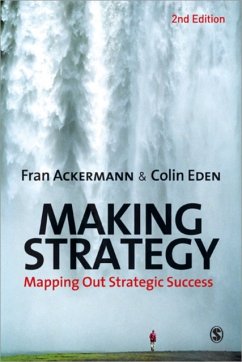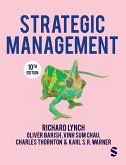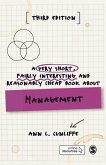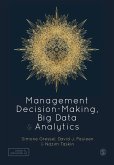'Demystifies strategy making while at the same time deepening our understanding of what the process entails. Their work is a marvellous guide for those striving to make sense of complexity' -
Karl E. Weick, Rensis Likert Distinguished University Professor of Organizational Behavior and Psychology, University of Michigan
'This book is at the very cutting edge of strategic management theory and yet also of immense practical use. It is truly a rare and stunning achievement' -
John M Bryson, McKnight Presidential Professor of Planning and Public Affairs, Hubert H. Humphrey Institute of Public Affairs, University of Minnesota
'Using this book enabled me to facilitate a multicultural team of seven managers so that they very quickly got to grips with the challenges and opportunities facing the organization and developed a realistic workable strategy, whilst at the same time building a real sense of team cohesion and the feeling that individuals had been listened to' -
Alison Devine, Director, British Council, Taipai
This lucid and highly-accessible text addresses the challenges of how to build a robust and implementable strategy. Strategy making is seen as something relevant to managers of departments, divisions, SME's, as well as the top management teams of public and for-profit organizations.
Four key routes to creating a strategy are discussed. These routes, when taken together, provide a powerful means for agreeing a negotiated strategy, and comprise: strategic issue management, agreeing organizational purpose, competitiveness from the exploitation and protection of distinctiveness, and the strategic management of stakeholders. The designs have been used extensively, in a wide range of countries, by management teams in all types of organisations.
Karl E. Weick, Rensis Likert Distinguished University Professor of Organizational Behavior and Psychology, University of Michigan
'This book is at the very cutting edge of strategic management theory and yet also of immense practical use. It is truly a rare and stunning achievement' -
John M Bryson, McKnight Presidential Professor of Planning and Public Affairs, Hubert H. Humphrey Institute of Public Affairs, University of Minnesota
'Using this book enabled me to facilitate a multicultural team of seven managers so that they very quickly got to grips with the challenges and opportunities facing the organization and developed a realistic workable strategy, whilst at the same time building a real sense of team cohesion and the feeling that individuals had been listened to' -
Alison Devine, Director, British Council, Taipai
This lucid and highly-accessible text addresses the challenges of how to build a robust and implementable strategy. Strategy making is seen as something relevant to managers of departments, divisions, SME's, as well as the top management teams of public and for-profit organizations.
Four key routes to creating a strategy are discussed. These routes, when taken together, provide a powerful means for agreeing a negotiated strategy, and comprise: strategic issue management, agreeing organizational purpose, competitiveness from the exploitation and protection of distinctiveness, and the strategic management of stakeholders. The designs have been used extensively, in a wide range of countries, by management teams in all types of organisations.
Eden and Ackermann remain at the leading edge of theory and practice in strategy making. This book demystifies strategy making while at the same time deepening our understanding of what the process entails. Their work is a marvellous guide for those striving to make sense of complexity
Karl E. Weick
Rensis Likert Distinguished University Professor of Organizational Behavior and Psychology, University of Michigan
This book is at the very cutting edge of strategic management theory and yet also of immense practical use. It is truly a rare and stunning achievement
John M Bryson
McKnight Presidential Professor of Planning and Public Affairs, Hubert H. Humphrey Institute of Public Affairs, University of Minnesota
Using this book enabled me to facilitate a multicultural team of seven managers so that they very quickly got to grips with the challenges and opportunities facing the organization and developed a realistic workable strategy, whilst at the same time building a real sense of team cohesion and the feeling that individuals had been listened to
Alison Devine
Director, British Council, Taipai
This is an insightful book on strategy formulation that achieves the difficult task of bridging cutting-edge theory with practical application. The book will be of immense use for academics, practitioners and students of strategy. Where most strategy books focus almost exclusively on issues of strategy analysis, with perhaps a little strategy process sprinkled in for good measure, this book turns this traditional approach on its head by addressing the often neglected yet arguably more challenging task of making strategy in complex organizations. It is the internal organizational dynamics of strategy-making, whether they be managing stakeholders, facilitating group strategy workshops, dealing with organizational politics, identifying sources of competitive advantage or mapping out strategies, which determine strategic success. At its core the book advances a very simple, yet absolutely fundamental notion that strategy-making is inherently a social process. It gives very clear guidance on how these social processes can be managed to build better strategies. Most strategy books come from an economic perspective, which ignore substantive issues of how strategies are made because they implicitly assume that organizations are impenetrable, unknowable black boxes. Ackerman and Eden have blown open the black box of strategy-making in organizations, offering theoretically rich, but also very practical advice on how strategies can be formulated in complex organizations. In sum, this is a book that needed to be written. Ackerman and Eden should be commended for doing a first-rate job
Dr. R. Bradley MacKay
Senior Lecturer in Strategy, Head of Strategy and Internat. Bus. Group, University of Edinburgh Business School
I strongly recommend this book to any researcher, consultant and practitioner interested in putting the competence based approach to strategy making into practice. Based on an extended experience with management teams in a diversity of settings and industries, the authors offer a step by step methodology for implementing competence based strategic management. This makes it an indispensible guide for practitioners and consultants. Researchers in competence based strategic management will appreciate its theoretical rigour and its terminological preciseness and consistency. Among the many books on competence based strategic management it is undoubtedly one of the best contributions I have ever seen. I personally use it in my teaching and consulting practice, and I can assure readers that IT REALLY WORKS. With this book Ackermann and Eden confirm their leading position in spreading an approach to strategic management based on a systemic, dynamic, cognitive, and holistic perspective on real life managers' concerns when practicing strategy
Professor Aime Heene
Lecturer in European Business and Corporate Strategy, College of Europe, Bruges, Belgium
Karl E. Weick
Rensis Likert Distinguished University Professor of Organizational Behavior and Psychology, University of Michigan
This book is at the very cutting edge of strategic management theory and yet also of immense practical use. It is truly a rare and stunning achievement
John M Bryson
McKnight Presidential Professor of Planning and Public Affairs, Hubert H. Humphrey Institute of Public Affairs, University of Minnesota
Using this book enabled me to facilitate a multicultural team of seven managers so that they very quickly got to grips with the challenges and opportunities facing the organization and developed a realistic workable strategy, whilst at the same time building a real sense of team cohesion and the feeling that individuals had been listened to
Alison Devine
Director, British Council, Taipai
This is an insightful book on strategy formulation that achieves the difficult task of bridging cutting-edge theory with practical application. The book will be of immense use for academics, practitioners and students of strategy. Where most strategy books focus almost exclusively on issues of strategy analysis, with perhaps a little strategy process sprinkled in for good measure, this book turns this traditional approach on its head by addressing the often neglected yet arguably more challenging task of making strategy in complex organizations. It is the internal organizational dynamics of strategy-making, whether they be managing stakeholders, facilitating group strategy workshops, dealing with organizational politics, identifying sources of competitive advantage or mapping out strategies, which determine strategic success. At its core the book advances a very simple, yet absolutely fundamental notion that strategy-making is inherently a social process. It gives very clear guidance on how these social processes can be managed to build better strategies. Most strategy books come from an economic perspective, which ignore substantive issues of how strategies are made because they implicitly assume that organizations are impenetrable, unknowable black boxes. Ackerman and Eden have blown open the black box of strategy-making in organizations, offering theoretically rich, but also very practical advice on how strategies can be formulated in complex organizations. In sum, this is a book that needed to be written. Ackerman and Eden should be commended for doing a first-rate job
Dr. R. Bradley MacKay
Senior Lecturer in Strategy, Head of Strategy and Internat. Bus. Group, University of Edinburgh Business School
I strongly recommend this book to any researcher, consultant and practitioner interested in putting the competence based approach to strategy making into practice. Based on an extended experience with management teams in a diversity of settings and industries, the authors offer a step by step methodology for implementing competence based strategic management. This makes it an indispensible guide for practitioners and consultants. Researchers in competence based strategic management will appreciate its theoretical rigour and its terminological preciseness and consistency. Among the many books on competence based strategic management it is undoubtedly one of the best contributions I have ever seen. I personally use it in my teaching and consulting practice, and I can assure readers that IT REALLY WORKS. With this book Ackermann and Eden confirm their leading position in spreading an approach to strategic management based on a systemic, dynamic, cognitive, and holistic perspective on real life managers' concerns when practicing strategy
Professor Aime Heene
Lecturer in European Business and Corporate Strategy, College of Europe, Bruges, Belgium








